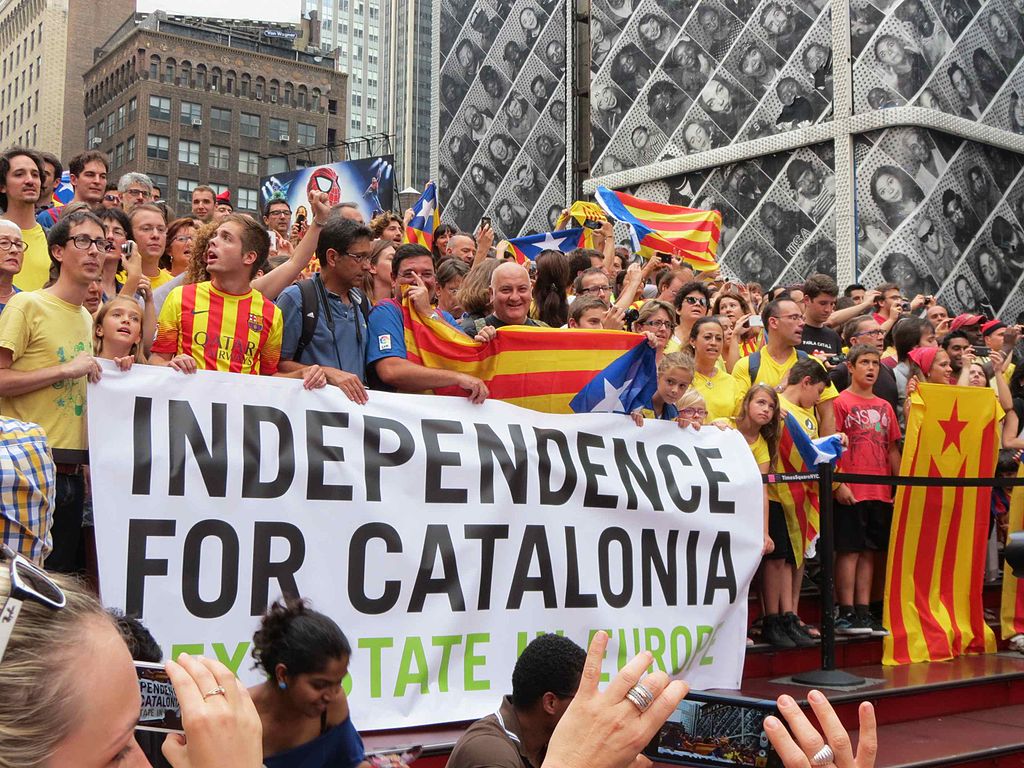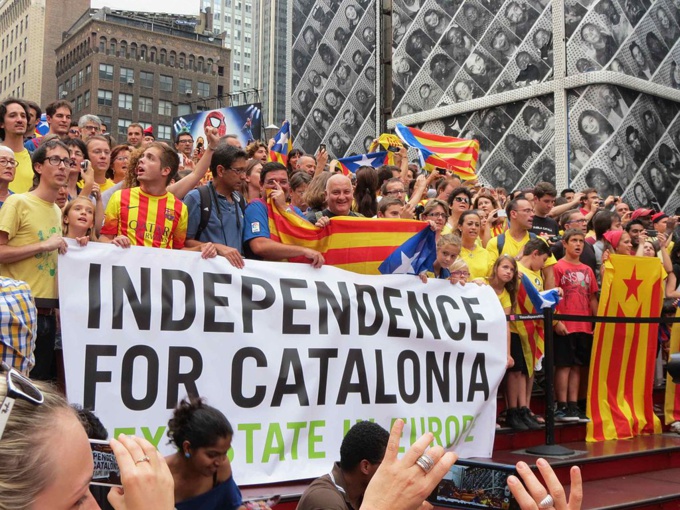The secret document includes a plan for the unilateral separation of Catalonia from Spain, if its citizens fail to hold a referendum on independence this autumn. This caused a fierce reaction from Madrid.
Spanish Defense Minister María Dolores de Cospedal compared this step to a coup d'état. At the same time, Madrid keeps refusing the idea of holding a referendum on the independence of Catalonia, despite the fact that almost every survey over the past few years has shown that 80% of Catalans are in favor of it.
This will mean a loss of 25-30% of Spain's GDP, said Spanish Minister of Economy Luis de Guindos. And this is what the government "will never allow."
Yet, Catalonia has a card up its sleeve. This is a debt bomb of delayed action. Catalonia can no longer service its own debt; about 60% of its funds depend on the National Fund of Liquidity of the central government. In April last year, Fitch rating agency lowered the credit rating of Catalonia to the "garbage" level and warned that the region had serious liquidity problems that would require "proactive management" and "close cooperation with the central government". Apparently, this is something that is clearly not included in the regional government’s plans in the near future.
At the same time, the national debt of Spain continues to grow, having already reached 100% of GDP. The debt service can get out of hand even with historically low interest rates. Between 2011 and 2015, the central government of Spain spent 121 billion euro (12% of annual GDP) on interest payments.
Minister of Finance of Catalonia Oriol Junqueras earlier told that Rajoy’s government has already spent the surplus of the Social Insurance Fund at 65 billion euros, and now uses a "toxic" combination of taxes and public debt to finance the growing deficit of the country’s pension system.
In other words, Spain's budget deficit, one of the largest in Europe, will remain at a high level in the foreseeable future, despite all the threats of fines of several billion euro originating from Brussels.
Approximately the same said the US rating agency Moody's: in fact, the markets will automatically regard any default on Catalonia’s debt as Spanish.
Now, the government of Catalonia seems to have decided to be the initiator of all the fights with the central government in Madrid, that is, to provoke a financial collapse for both sides. Catalans are deliberately prudent, cautious people. Thus, it is fair to assume that at least part of what lies behind the recent escalation of tension by the regional government with Madrid is a bluff.
But a big bluff can sometimes lead to a very dangerous path, from which it is difficult to get off. The Catalan government can hope threatening to declare independence unilaterally will finally push the Spanish government to the need to compromise.
In some areas of Catalonia, including Barcelona, public support for the idea of independence appears to be rather weak. However, many nationalists in the Catalan government see this is an unacceptable option. As for the Rajoy government, its strong defense of the territorial integrity of the country is an important point in the voting process for its main supporters. And now, when new corruption scandals around senior members of Rajoy’s People's Party are popping up every two weeks, the party cannot afford to lose these votes.
In other words, prospects for a solution that is convenient for both sides in the coming months are not large. Chances of a failed result are growing every day. Does this mean that Spain, the fourth largest economy of the euro zone, is on the brink of collapse? Probably not. Yet, Madrid can eventually take decisive (and deeply symbolic) actions, including referring to Article 155 of the Constitution, which will effectively put an end to all forms of self-government in Catalonia. And this can only contribute to strengthening the resolve of the Catalan separatists and further polarization disagreements in the rich region of Spain. If the locals can no live there, unrest will begin.
source: elpais.com
Spanish Defense Minister María Dolores de Cospedal compared this step to a coup d'état. At the same time, Madrid keeps refusing the idea of holding a referendum on the independence of Catalonia, despite the fact that almost every survey over the past few years has shown that 80% of Catalans are in favor of it.
This will mean a loss of 25-30% of Spain's GDP, said Spanish Minister of Economy Luis de Guindos. And this is what the government "will never allow."
Yet, Catalonia has a card up its sleeve. This is a debt bomb of delayed action. Catalonia can no longer service its own debt; about 60% of its funds depend on the National Fund of Liquidity of the central government. In April last year, Fitch rating agency lowered the credit rating of Catalonia to the "garbage" level and warned that the region had serious liquidity problems that would require "proactive management" and "close cooperation with the central government". Apparently, this is something that is clearly not included in the regional government’s plans in the near future.
At the same time, the national debt of Spain continues to grow, having already reached 100% of GDP. The debt service can get out of hand even with historically low interest rates. Between 2011 and 2015, the central government of Spain spent 121 billion euro (12% of annual GDP) on interest payments.
Minister of Finance of Catalonia Oriol Junqueras earlier told that Rajoy’s government has already spent the surplus of the Social Insurance Fund at 65 billion euros, and now uses a "toxic" combination of taxes and public debt to finance the growing deficit of the country’s pension system.
In other words, Spain's budget deficit, one of the largest in Europe, will remain at a high level in the foreseeable future, despite all the threats of fines of several billion euro originating from Brussels.
Approximately the same said the US rating agency Moody's: in fact, the markets will automatically regard any default on Catalonia’s debt as Spanish.
Now, the government of Catalonia seems to have decided to be the initiator of all the fights with the central government in Madrid, that is, to provoke a financial collapse for both sides. Catalans are deliberately prudent, cautious people. Thus, it is fair to assume that at least part of what lies behind the recent escalation of tension by the regional government with Madrid is a bluff.
But a big bluff can sometimes lead to a very dangerous path, from which it is difficult to get off. The Catalan government can hope threatening to declare independence unilaterally will finally push the Spanish government to the need to compromise.
In some areas of Catalonia, including Barcelona, public support for the idea of independence appears to be rather weak. However, many nationalists in the Catalan government see this is an unacceptable option. As for the Rajoy government, its strong defense of the territorial integrity of the country is an important point in the voting process for its main supporters. And now, when new corruption scandals around senior members of Rajoy’s People's Party are popping up every two weeks, the party cannot afford to lose these votes.
In other words, prospects for a solution that is convenient for both sides in the coming months are not large. Chances of a failed result are growing every day. Does this mean that Spain, the fourth largest economy of the euro zone, is on the brink of collapse? Probably not. Yet, Madrid can eventually take decisive (and deeply symbolic) actions, including referring to Article 155 of the Constitution, which will effectively put an end to all forms of self-government in Catalonia. And this can only contribute to strengthening the resolve of the Catalan separatists and further polarization disagreements in the rich region of Spain. If the locals can no live there, unrest will begin.
source: elpais.com



















